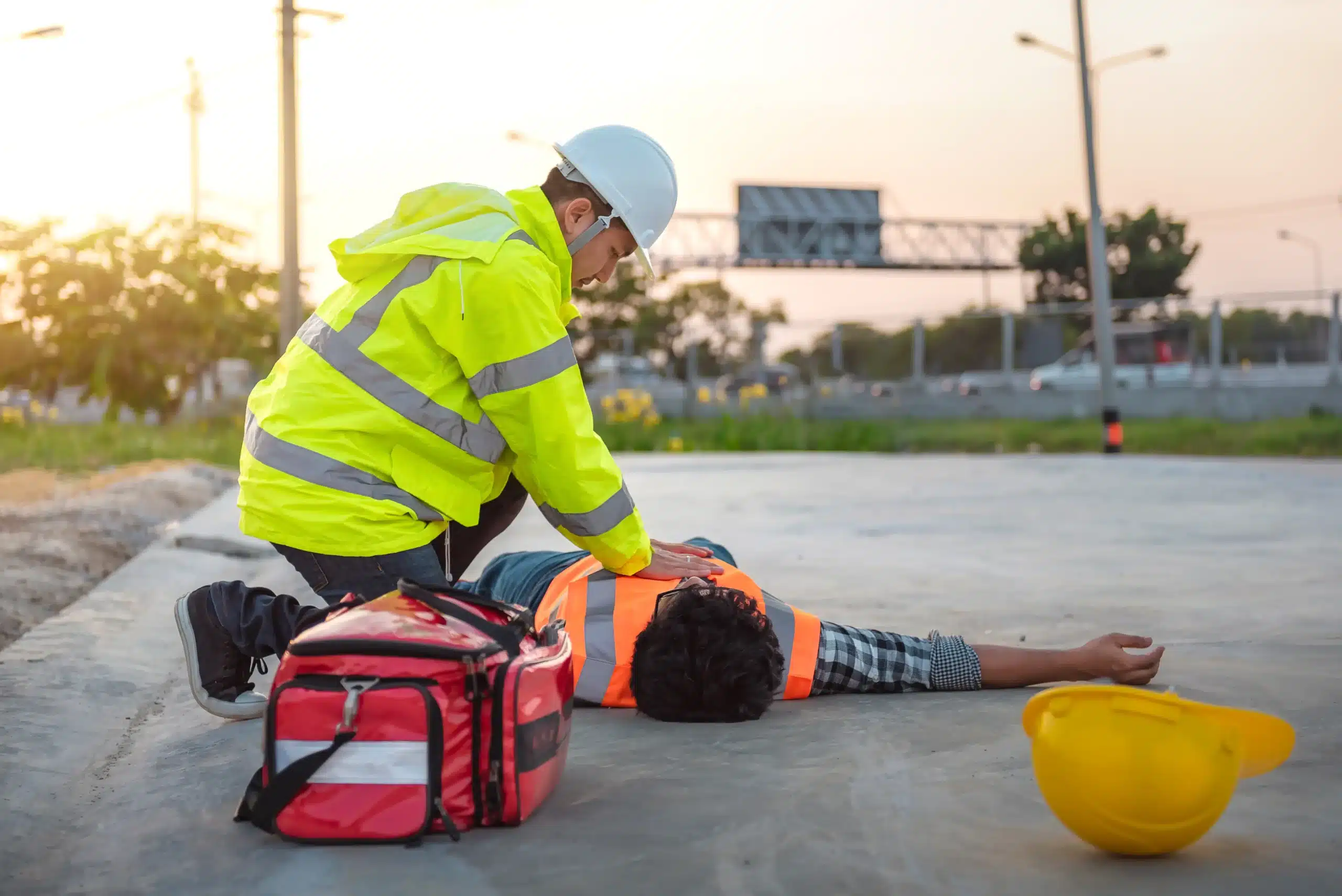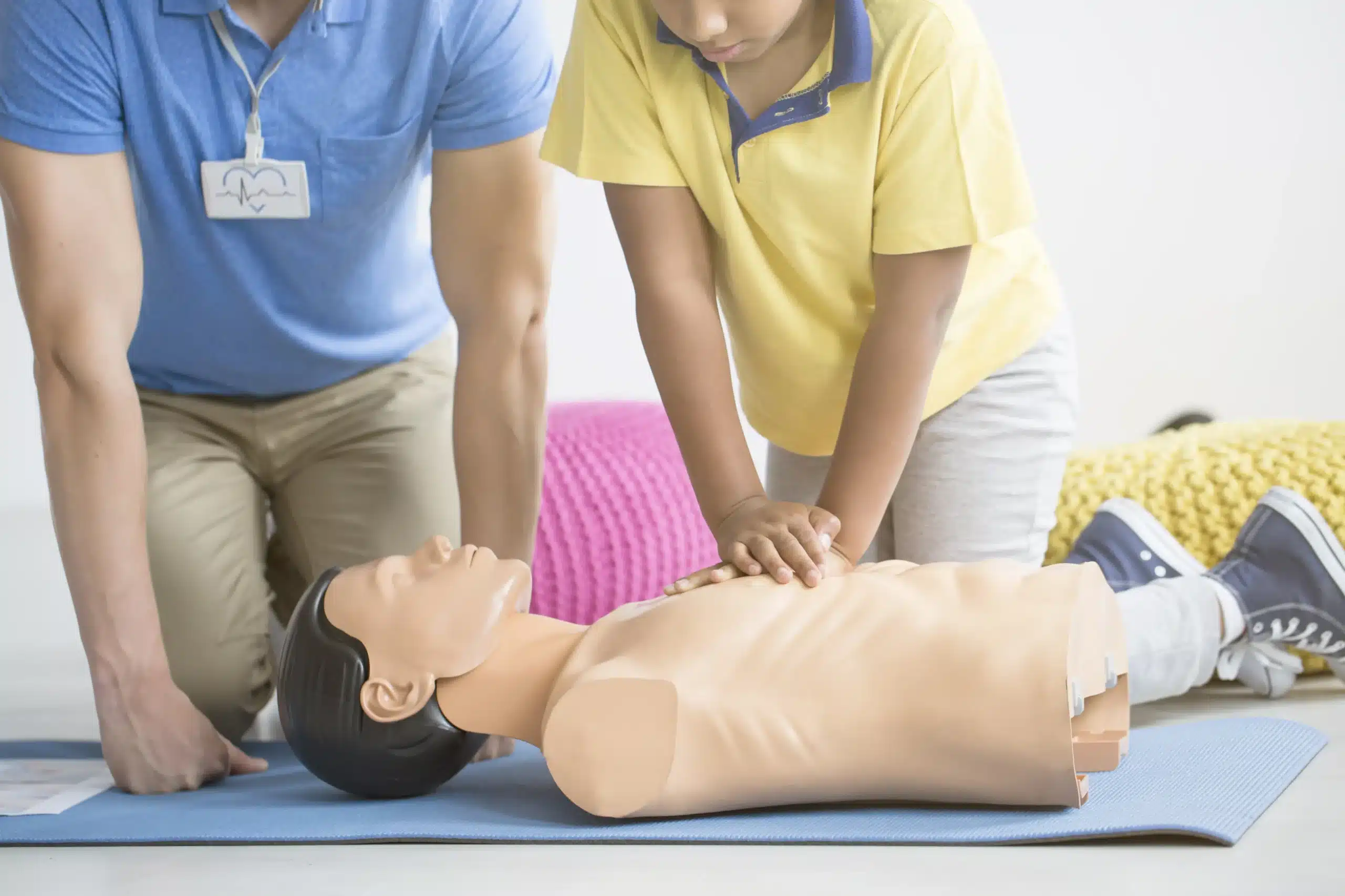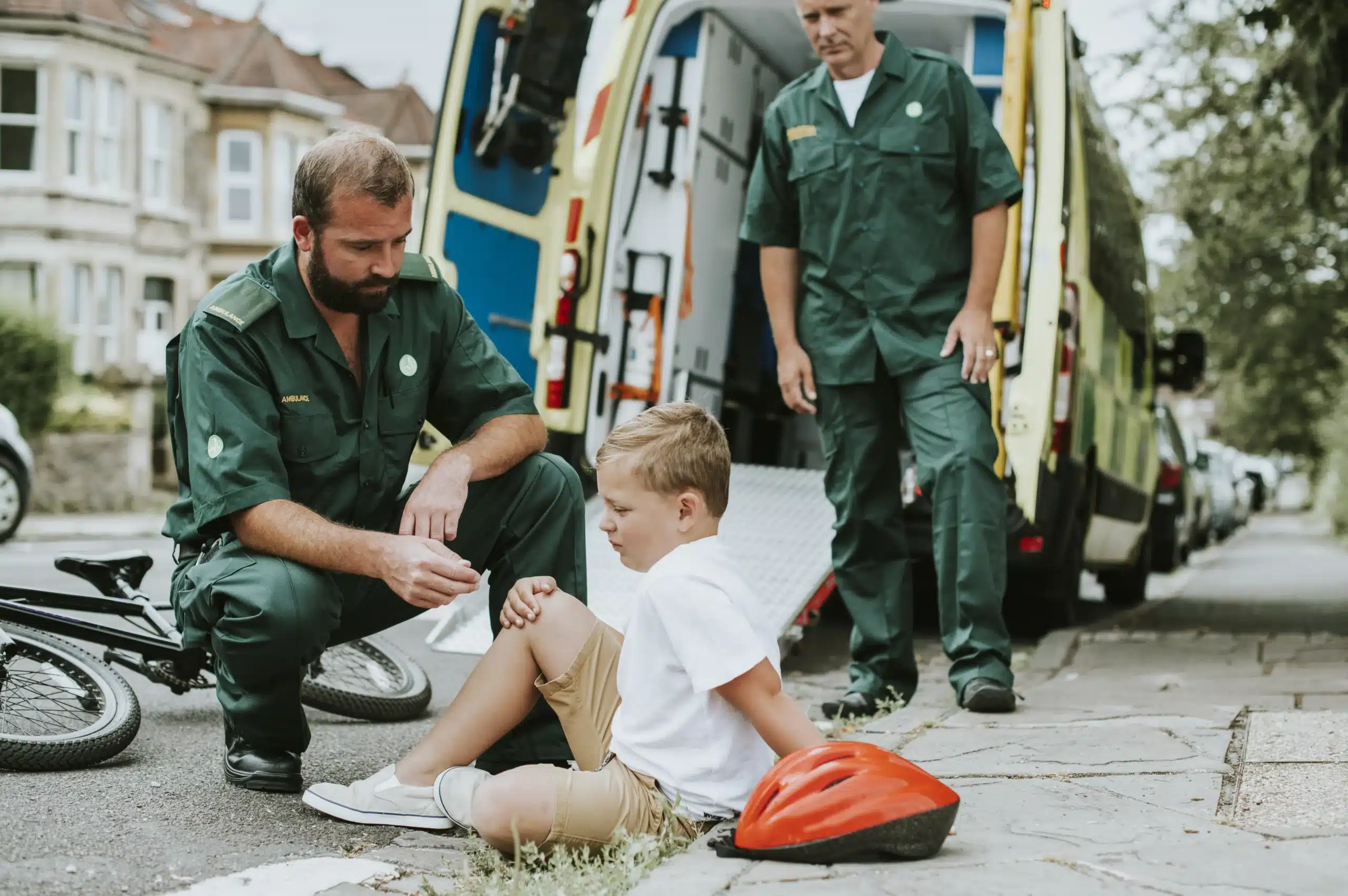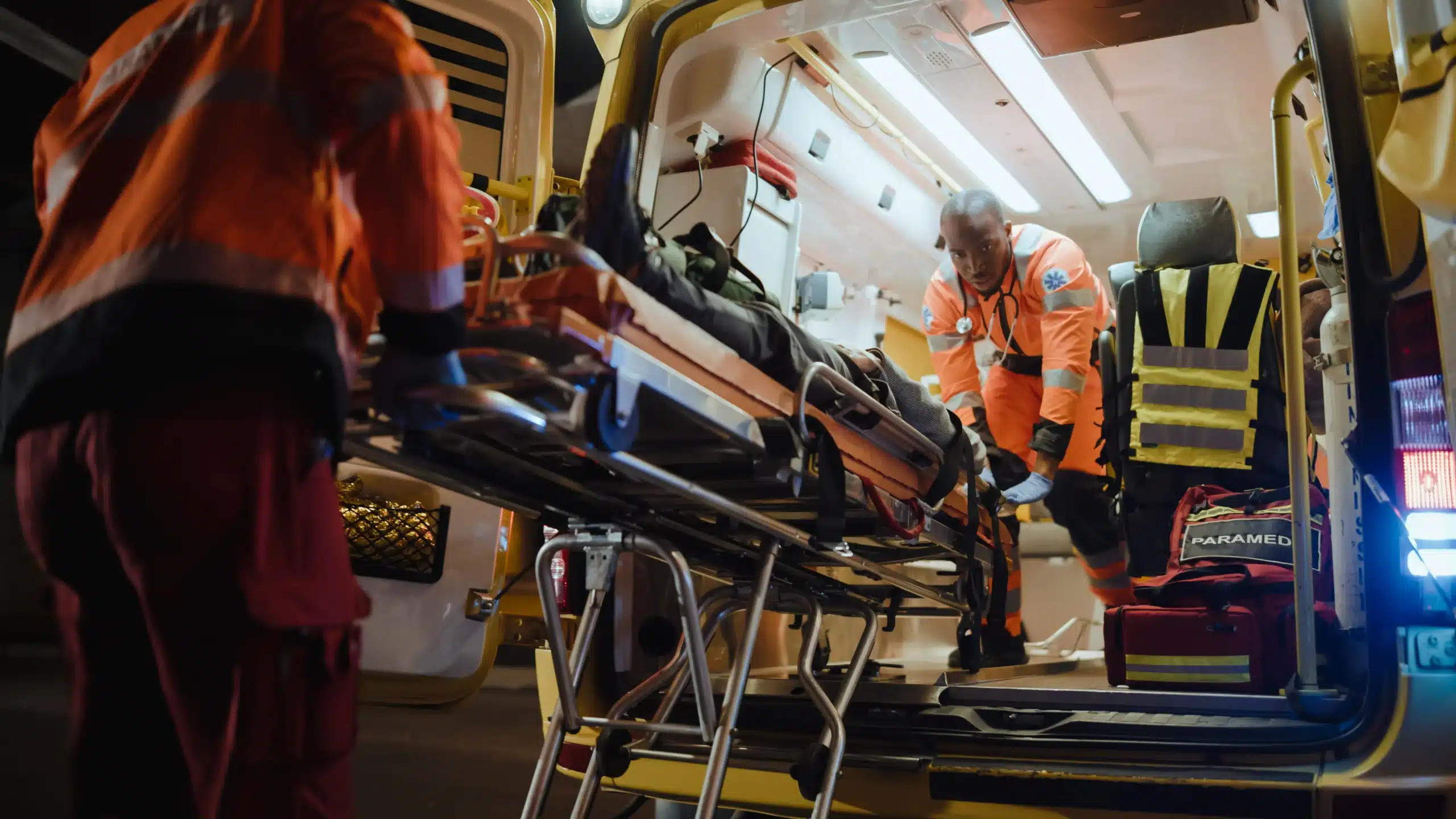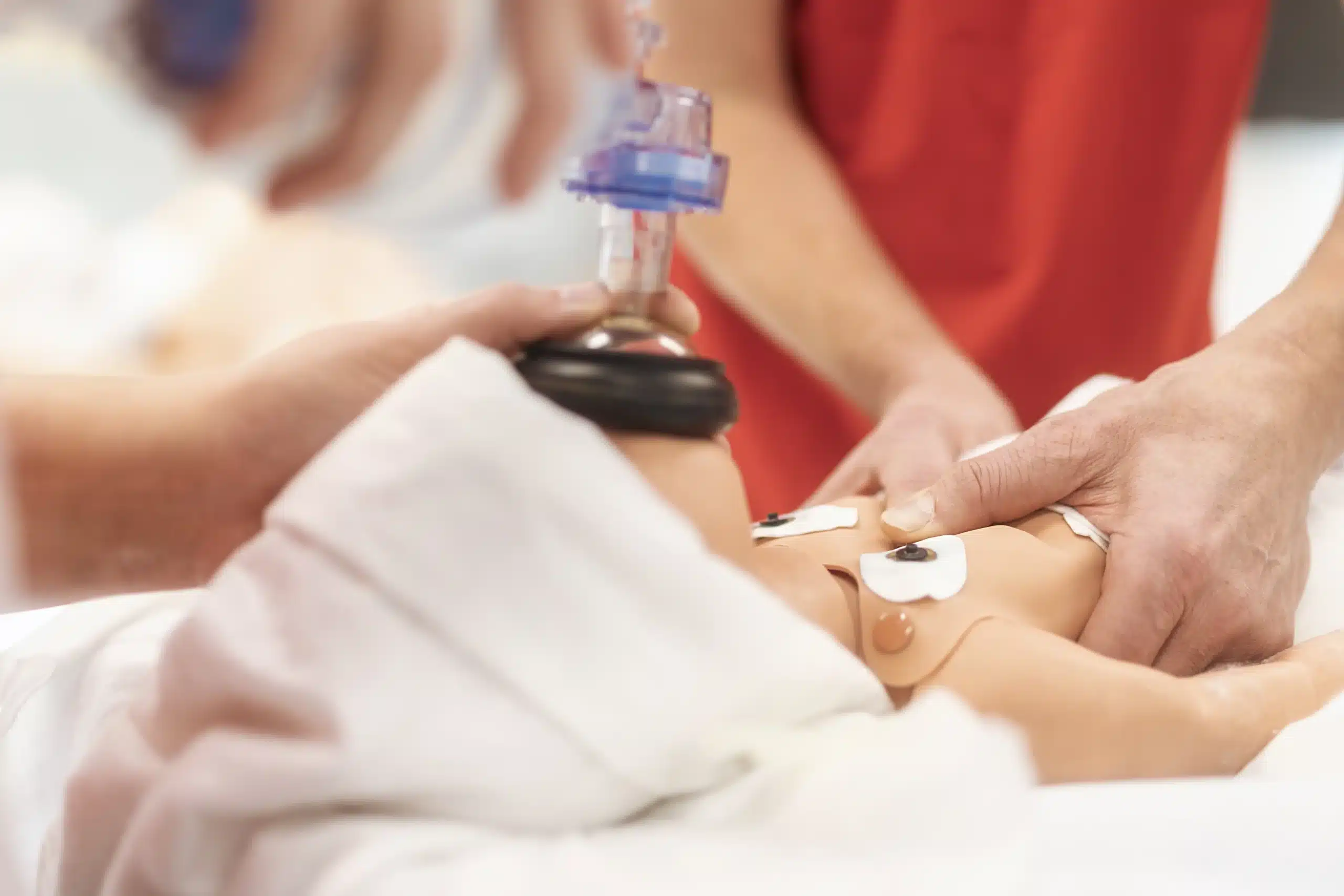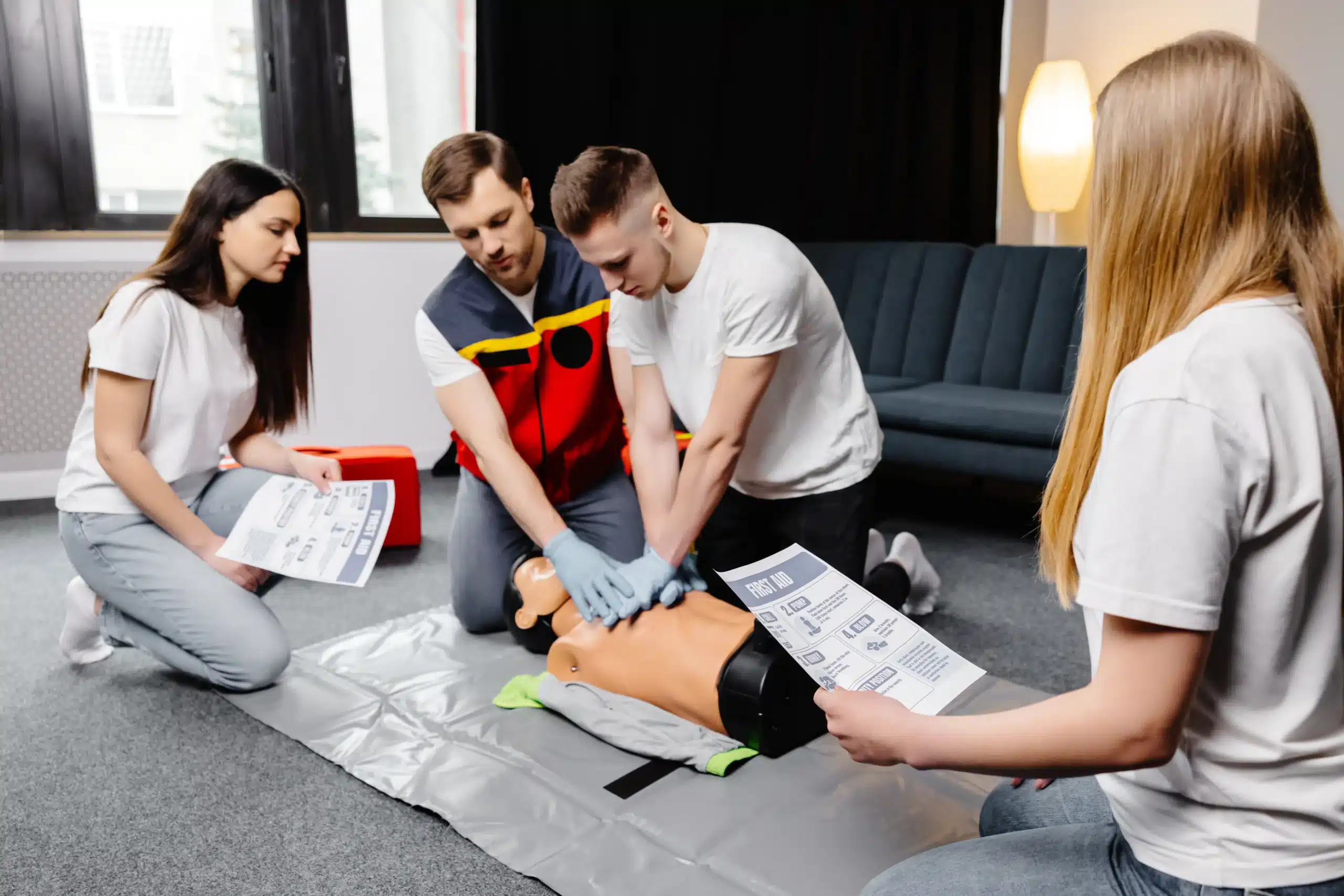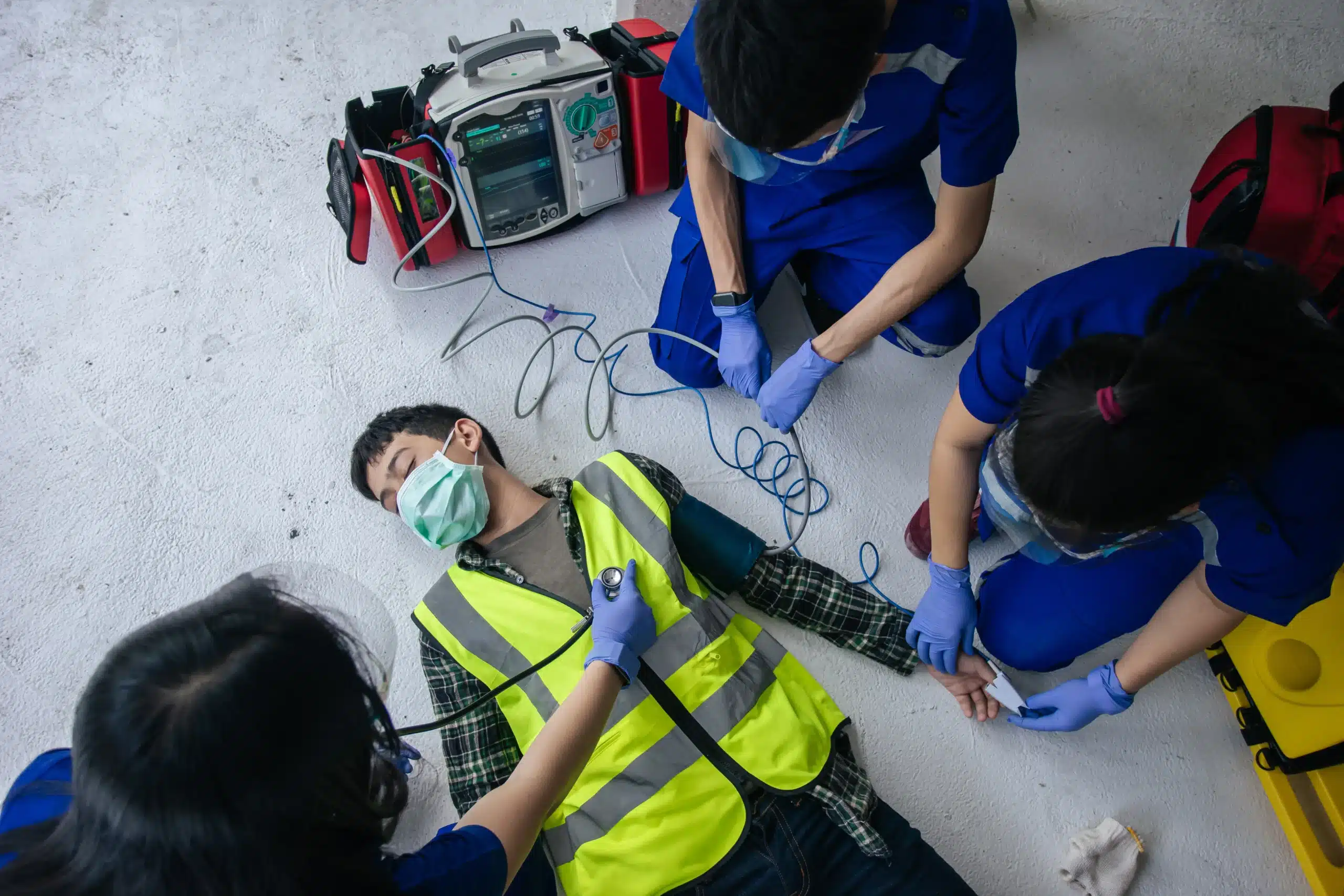In a critical situation, seconds can matter. CPR can be the bridge between life and death, and having the right training can make all the difference. This comprehensive guide simplifies the process of getting your CPR certification, covering everything from choosing the right course to understanding costs and renewal procedures. Whether you’re a healthcare provider, a concerned parent, or simply someone who wants to be prepared, we’ll help you find “CPR certification near me” and gain the confidence to act decisively in an emergency. Let’s explore the different types of CPR certification, reputable training providers, and how to prepare for your training.
Key Takeaways
- CPR certification empowers you to help in emergencies: Equipping yourself with CPR training builds confidence and provides the skills to respond effectively in critical situations, regardless of your background. Select a course that aligns with your personal or professional goals.
- Finding the right course matters: Research reputable providers such as the American Heart Association, American Red Cross, or local training centers like Morgan Hill CPR Classes. Prioritize courses with comprehensive content, hands-on practice, and flexible scheduling options.
- Preparation and practice are key for success: Review any pre-course materials, engage actively during training, and refresh your CPR skills regularly. Consistent practice ensures you’re always ready to assist in an emergency.
What is CPR Certification?
CPR certification equips you with the skills to perform cardiopulmonary resuscitation. It’s a formal process, culminating in a credential that recognizes your ability to administer CPR correctly. While you don’t technically need certification to perform CPR in an emergency, proper training ensures you can act confidently and effectively. A structured course guides you through the correct techniques, covering chest compressions and rescue breathing, and builds your confidence to potentially save a life.
Choosing the right CPR certification course is essential. Think about your role—are you a healthcare professional, a concerned parent, or someone wanting to be prepared for anything? Different courses cater to different needs. For example, healthcare providers often pursue BLS certification, while a basic CPR and first-aid course might suit someone looking for general knowledge. Understanding your needs will help you find the perfect fit. CPR certification isn’t about extensive medical training; it’s about empowering anyone who wants to learn this life-saving skill. It’s about knowing you have the tools to make a difference in a critical situation.
Find Reputable CPR Certification Providers Near You
Finding the right CPR certification provider is crucial for receiving high-quality training. Here’s a breakdown of reputable organizations and how to choose the best fit for your needs:
American Heart Association (AHA)
The American Heart Association sets the standard for resuscitation guidelines. AHA-certified courses are widely recognized and accepted. They offer various courses designed to equip people with the skills to respond effectively in cardiac emergencies. When considering an AHA course, look for providers who offer comprehensive content aligned with the latest AHA guidelines. For example, Morgan Hill CPR Classes offers AHA-aligned BLS training.
American Red Cross
The American Red Cross is another respected organization offering various CPR training courses, including certification options. You can find in-person classes, online modules, or blended learning formats. Red Cross certification is generally valid for two years. Check their website to find a class near you.
Local Training Centers
Local training centers often provide convenient CPR certification courses. When choosing a local center, research the instructors’ qualifications and the organization’s credibility. Look for positive reviews and testimonials to understand the quality of training offered. A reputable local center will have experienced instructors, updated materials, and a commitment to student success. Preparing in advance can also contribute to a positive learning experience. Morgan Hill CPR Classes offers helpful resources for course preparation.
Morgan Hill CPR Classes
Morgan Hill CPR Classes offers a comprehensive selection of American Heart Association courses, including CPR, BLS, ACLS, PALS, and First Aid. Serving Morgan Hill, San Jose, and Gilroy, CA, they focus on providing accessible and affordable training with a low-price guarantee. This makes it easier for individuals and groups to get certified. Check out their group discounts for even more cost-effective options. They also offer ACLS certification for healthcare professionals seeking advanced training.
Types of CPR Certification Courses
Knowing which CPR certification is right for you can feel overwhelming with so many options. This section breaks down the most common types of CPR courses, from basic CPR and first aid to specialized certifications like BLS, ACLS, and PALS. We’ll also look at the different learning formats available, including in-person, online, and blended learning.
Basic CPR and First Aid
Basic CPR and first aid courses are perfect for anyone who wants to learn essential lifesaving skills. These courses cover the fundamentals of CPR, how to use an AED (automated external defibrillator), and basic first aid techniques for common injuries like cuts and burns. A basic CPR and first aid certification is a great option for anyone, whether you’re a concerned citizen, a teacher, or simply want to be prepared for emergencies.
BLS (Basic Life Support)
BLS certification is a critical credential for healthcare providers, first responders, and other professionals in the medical field. It goes beyond basic CPR, teaching more advanced techniques like high-quality CPR for adults, children, and infants, along with how to use a bag-mask device and manage airway obstructions. BLS training also emphasizes teamwork and communication during emergencies. If you’re pursuing a career in healthcare, BLS certification is often a prerequisite.
ACLS (Advanced Cardiac Life Support)
ACLS certification is designed for healthcare professionals who deal with cardiovascular emergencies. This advanced course covers complex topics like managing cardiac arrest, recognizing and treating strokes, and understanding electrocardiograms (ECGs). ACLS training is essential for doctors, nurses, paramedics, and other medical personnel working in critical care settings. It builds upon the skills learned in BLS, providing a more in-depth understanding of life-threatening cardiac events.
PALS (Pediatric Advanced Life Support)
PALS certification focuses on providing emergency care for infants and children. It equips healthcare providers with the knowledge and skills to recognize and respond to life-threatening situations in pediatric patients. PALS training covers topics like respiratory emergencies, shock, and post-resuscitation care. This certification is crucial for pediatricians, pediatric nurses, and other healthcare professionals who regularly work with children.
In-Person, Online, or Blended Learning
CPR certification courses are offered in various formats to fit different learning styles and schedules. In-person classes provide hands-on training and direct interaction with instructors, allowing for immediate feedback and personalized guidance. Online courses offer flexibility and convenience, allowing you to learn at your own pace from anywhere with an internet connection. Blended learning combines online modules with in-person skills sessions, offering a balance of flexibility and practical experience. When choosing a format, consider your learning preferences and the level of interaction you need to feel confident in your skills. For example, if you learn best by doing, an in-person or blended learning course might be a better fit.
CPR Certification: Cost and Duration
CPR certification is a valuable investment, but understanding the costs and time commitment involved is essential. Let’s break down the typical price range, factors influencing cost, and the duration of different CPR courses.
Average Price Range and Cost Factors
CPR training costs vary, typically ranging from $14 to over $100, depending on several factors. The level of certification (basic CPR, BLS, ACLS, PALS) plays a significant role. More advanced courses naturally come with a higher price tag due to the specialized knowledge and skills taught. The course format also matters. In-person classes often cost more than online or blended learning options because of the resources required for hands-on training. Finally, your location can influence pricing, as costs can differ between training centers and regions.
Group and Corporate Discounts
Many CPR training providers offer discounts for group and corporate bookings. This can be a cost-effective way to train your team or organization. Contact providers directly to explore available discounts and tailor training to your organization’s needs.
Low Price Guarantees
Some training centers offer a low-price guarantee, ensuring you get the most affordable training in your area. This provides peace of mind knowing you’re getting a good value. Always compare prices and look for guarantees to maximize your training budget.
Typical Course Duration and Time Commitment
The time commitment for CPR certification varies depending on the course type. Basic CPR and First Aid courses can often be completed in a few hours, while more advanced certifications like BLS may take a bit longer. Review the course materials to prepare fully for your training. Generally, CPR certification courses range from approximately two to four hours.
CPR Certification: Validity and Renewal
CPR certification makes a difference—but only if your skills are current. Knowing how long your certification lasts and how to renew is key to staying prepared for emergencies.
How Long is CPR Certification Valid?
CPR certifications are typically valid for two years. This standard applies to most programs, including those from the American Heart Association and the American Red Cross. After two years, guidelines can change, and your skills might not be as sharp. Renewing your certification ensures you’re always ready to provide effective assistance.
Renew Your Certification
Even if your CPR certification has lapsed, remember that performing CPR in an emergency is always better than doing nothing. It’s still crucial to get recertified as soon as possible. Check with your original certifying organization or look for convenient renewal courses near you. At Morgan Hill CPR Classes, we offer a variety of renewal options to fit your schedule.
Keep Your Skills Current
CPR isn’t something you learn once and forget. Like any skill, it requires regular practice. Ideally, you should refresh your knowledge every few months. Even quick reviews of the basic steps can make a difference. Consider taking refresher courses or practicing with friends or family to maintain your confidence and effectiveness. This consistent practice will ensure you’re always prepared to act quickly and confidently in a real emergency. For those looking for affordable options, Morgan Hill CPR Classes offers a low price guarantee on all our courses. Check out our course preparation page to get a head start.
Choose the Right CPR Certification Course
Picking the right CPR certification course isn’t one-size-fits-all. It depends on your specific needs and what you want to achieve. This section walks you through key considerations to help you make the best choice.
Assess Your Needs and Goals
First, think about why you need CPR certification. Are you a healthcare professional needing ACLS certification? Or are you simply looking for a basic CPR and First Aid course for personal knowledge or workplace requirements? Understanding your goals will guide you toward the right course level. For example, healthcare providers often require specialized training like the American Heart Association’s BLS course. A general audience might benefit from a basic CPR and First Aid certification. Also, consider the reputation of the provider and the comprehensiveness of the course content. Online CPR Certification offers a helpful deep dive into CPR certifications.
Consider Your Schedule and Learning Style
Life gets busy, so finding a course that fits your schedule is essential. Do you prefer a weekend class, evening sessions, or the flexibility of online learning? Also, consider your learning style. Some people thrive in hands-on environments, while others prefer a more blended approach. Think about what works best for you and look for courses that cater to your preferences. Heart Start CPR offers advice on choosing the right CPR course and emphasizes the importance of qualified instructors and credible training providers.
Evaluate Course Content and Hands-On Practice
Look closely at what each course covers. Does it include the latest CPR guidelines and techniques? Does it offer adequate hands-on practice? A good course should combine theoretical knowledge with practical skills training. For example, the curriculum of Morgan Hill’s CPR and First-aid classes is comprehensive, ensuring that participants receive thorough training. CPR training costs can vary (CPR Newport News discusses CPR costs), so research the average price range in your area. Consider providers like Morgan Hill CPR Classes that offer a low-price guarantee when comparing options. Group discounts might also be available.
Read Reviews and Testimonials
Before committing to a course, see what other students have to say. Online reviews and testimonials can offer valuable insights into the quality of instruction, the course content, and the overall learning experience. Look for providers who are transparent about their student feedback, like MyCPRCert, which showcases testimonials. This can give you a better sense of what to expect and help you make an informed decision. Don’t hesitate to ask the training center for references or to speak with past participants if you have any questions.
Prepare for Your CPR Certification
Getting ready for your CPR certification involves understanding what to expect, gathering any necessary materials, and addressing any concerns you might have. A little preparation goes a long way in ensuring a smooth and successful learning experience.
What to Expect During Training
CPR training blends theory and hands-on practice. Expect interactive sessions covering essential life-saving techniques, including chest compressions, rescue breaths, and how to recognize the signs of a cardiac arrest. You’ll work with realistic mannequins, allowing you to practice these skills in a safe and controlled environment. This hands-on training builds muscle memory and confidence, preparing you to respond effectively in real-life emergencies.
Essential Materials and Equipment
Most CPR training centers provide all the necessary equipment, including the mannequins used for practice. Many courses also incorporate feedback devices that monitor the quality of your compressions, offering real-time insights and helping you refine your technique. Check with your chosen provider to see if there are any specific materials you need to bring, such as a notebook or pen. Comfortable clothing is always a good idea, as you’ll be actively participating in the training sessions.
Tips for Successful Certification
To get the most out of your training, review any pre-course materials provided. Familiarizing yourself with basic concepts beforehand can help you absorb the information more effectively during the course. Active participation is key—ask questions, engage in discussions, and take advantage of the hands-on practice sessions. Consider a blended learning approach that combines online learning with in-person skills practice to reinforce your knowledge and ensure you meet all certification requirements. After the course, consistent practice is crucial for maintaining your skills and confidence.
Address Common Concerns and Misconceptions
It’s normal to have some concerns before starting CPR training. One common misconception is that CPR requires extensive medical knowledge. In reality, CPR techniques are straightforward and can be learned by anyone willing to practice. Some people worry about performing CPR incorrectly or the legal implications. Good Samaritan laws generally protect those who provide CPR in good faith, and your training will equip you with the knowledge and skills to act confidently in an emergency. Addressing these concerns beforehand can help you approach your training with a clear and focused mindset.
Related Articles
- Why CPR is Critical in Modern Healthcare
- CPR Certification in San Jose: Your Complete Guide – Morgan Hill CPR Classes
- CPR Renewal in Morgan Hill: Your Guide – Morgan Hill CPR Classes
- Online CPR Classes in San Jose: Your Certification Guide – Morgan Hill CPR Classes
- CPR Certification in Gilroy: Your Ultimate Guide – Morgan Hill CPR Classes
Frequently Asked Questions
What if I’m not sure which CPR certification is right for me?
If you’re unsure which CPR certification level is appropriate for you, consider your current role and future aspirations. If you’re a healthcare professional or aspire to be one, BLS or ACLS certification might be necessary. For general knowledge and preparedness, a basic CPR and first-aid course could suffice. Contacting a training center like Morgan Hill CPR Classes can provide personalized guidance based on your specific needs.
Are online CPR certifications as valid as in-person certifications?
Yes, online CPR certifications are generally accepted, especially for individuals seeking basic CPR and first-aid knowledge. However, blended learning, which combines online modules with in-person skills sessions, offers a more comprehensive learning experience. For healthcare professionals, in-person training is often preferred for its hands-on approach and immediate feedback from instructors.
How can I find CPR classes near me?
The American Heart Association and the American Red Cross websites offer resources to locate certified training centers in your area. You can also search online for local providers like Morgan Hill CPR Classes, which serves Morgan Hill, San Jose, and Gilroy, CA.
What can I do to prepare for my CPR class?
Reviewing any pre-course materials provided by your chosen training center can be beneficial. Wearing comfortable clothing to your class is recommended, as you’ll be actively participating in hands-on training sessions. Mentally preparing yourself to engage actively and ask questions during the course can also contribute to a positive learning experience.
How often do I need to renew my CPR certification?
Most CPR certifications are valid for two years. Staying up-to-date with the latest guidelines and maintaining your skills is crucial for providing effective assistance in emergencies. Contact your certifying organization or a local training center for renewal options.
